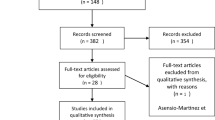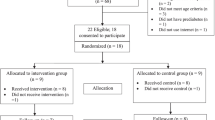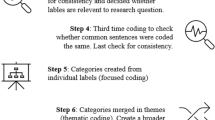Abstract
Physical Activity Counselling (PAC) is a Motivational Interviewing (MI)-based counselling intervention that has been shown to promote motivation for physical activity (PA), PA behaviour, and reduce depressive symptoms. However, no studies have looked at positive psychological variables, such as self-compassion (SC) within PAC. Moreover, no research has examined SC’s association with PA in the PAC context. Thus, the purpose of this study was to examine the impact of PAC over time on SC (total and subcomponents), and PA (total, moderate and strenuous), and to see if any improvements in SC and PA variables were sustained at 1-month follow-up. Lastly, this study examined the relationship between SC at endpoint and PA at follow-up. Insufficiently active individuals participating in the PAC program (N = 31) completed validated online questionnaires before, immediately after, and 1-month following PAC. Paired samples t-tests and repeated measures multivariate analysis of variance tests revealed that there were significant increases in total SC, self-kindness, and total, moderate, and strenuous PA from baseline to endpoint, as well as decreases in self-judgement, and isolation. These improvements were all sustained at 1-month follow-up. Finally, no significant relationship was found between SC and PA, likely due to the fact that self-compassionate individuals might prioritize other health behaviors such as sleep or healthy eating over PA. This provides preliminary experimental evidence to support MI-based PAC as an effective means to increase not only PA behaviour, but also SC, an important psychological resource that has been linked to a myriad of positive health benefits.




Similar content being viewed by others
Data Availability
The datasets generated during and/or analysed during the current study are available from the corresponding author on reasonable request.
Notes
As only moderate and strenuous intensity physical activity are recommended by national health guidelines and have been associated with maximal health benefits (Godin, 2011), mild intensity was not examined in the current study.
In other articles focusing on the PAC on-campus program, the behaviour change specialists have been referred to as counsellors. This wording has been changed in the present paper to comply with the definition of a Licenced Counsellor in Canada.
To ensure the results were not being biased by using a complete case analysis (i.e., only analyzing those who completed the PAC program and excluding those who dropped out), a baseline-observation-carried-forward approach was also run (i.e., including the 9 that did not complete the endpoint questionnaire). Both analyses yielded the same findings.
References
McFadden, T., Fortier, M., & Guerin, E. (2017) investigating the effects of physical activity counselling on depressive symptoms and physical activity in female undergraduate students with depression: A multiple baseline single-subject design. Mental Health and Physical Activity. 12, 25-36. https://doi.org/10.1016/j.mhpa.2017.01.002
Fortier, M. S., Hogg, W., O’Sullivan, T. L., Blanchard, C., Reid, R. D., Signal, R. J., Boulay, P., Doucet, E., Sweet, S., Bisson, E., & Beaulac, J. (2007a). The physical activity counselling (PAC) randomized controlled trial: Rationale, methods, and interventions. Applied Physiology, Nutrition, and Metabolism, 32(6), 1170-1185. https://doi.org/10.1139/H07-075
Fortier, M.S., Sweet, S.N., O’Sullivan, T.L., & Williams, G.C. (2007b). A self-determination process model of physical activity adoption in the context of a randomized controlled trial. Psychology of Sport and Exercise, 8(5), 741-757. https://doi.org/10.1016/j.psychsport.2006.10.006
Fortier, M. S., Hogg, W., O’Sullivan, T. L., Blanchard, C., Signal, R. J., Reid, R. D., Boulay, P., Doucet, E., Bisson, E., Beaulac, J., & Culver, D. (2011a). Impact of integrating a physical activity counsellor into the primary health care team: Physical activity and health outcomes of the physical activity counselling randomized controlled trial. Applied Physiology, Nutrition, and Metabolism, 36(4), 503-514. https://doi.org/10.1139/h11-040
Fortier, M. S., Wiseman, E., Sweet, S. N., O’Sullivan, T. L., Blanchard, C. M., Sigal, R. J., & Hogg, W. (2011b). A moderated mediation of motivation on physical activity in the context of the physical activity counseling randomized control trial. Psychology of Sport and Exercise, 12(2), 71-78. https://doi.org/10.1016/j.psychsport.2010.08.001
Pastore, O., & Fortier, M. (2020). Understanding the link between motivational interviewing and self-compassion. Canadian Journal of Counselling and Psychotherapy, 54(4), 846-860. https://doi.org/10.47634/cjcp.v54i4.69827
Bassam, K., Leconte, T., Gaudiano, B. A., & Paquin, K. (2013). Mindfulness interventions for psychosis: A meta-analysis. Schizophrenia Research, 150(1), 176–184. https://doi.org/10.1016/j.schres.2013.07.055
Biber, D. D., & Ellis, R. (2017). The effect of self-compassion on the self-regulation of health behaviors: A systematic review. Journal of Health Psychology., 00, 1–12. https://doi.org/10.1177/1359105317713361
Ceccarelli, L. A., Giuliano, R., & J., Glazebrook, C.M., & Strachan, S.M. . (2019). Self-compassion and psycho-physiological recovery from recalled sport failure. Frontiers in Psychology, 10, 156. https://doi.org/10.3389/fpsyg.2019.01564
Cohen, J. E. (1988). Statistical Power Analysis for the Behavioural Sciences. Lawrence Erlbaum Associates Inc.
Czosnek, L., Lederman, O., Cormie, P., Zopf, E., Stubbs, B., & Rosenbaum, S. (2019). Health benefits, safety and cost of physical activity interventions for mental health conditions: A meta-review to inform translation efforts. Mental Health and Physical Activity, 16, 140–151. https://doi.org/10.1016/j.mhpa.2018.11.001
Eberth, J., & Sedlmeier, P. (2012). The effects of mindfulness meditation: A meta-analysis. Mindfulness, 3(3), 174–189. https://doi.org/10.1007/s12671-012-0101-x
Ferrari, M., Hunt, C., Harrysunker, A., Abbott, M. J., Beath, A. P., & Einstein, D. A. (2019). Self-compassion interventions and psychosocial outcomes: A meta-analysis of RCTs. Mindfulness, 10(8), 1455–1473. https://doi.org/10.1007/s12671-019-01134-6
Gao, S., Stone, R. A., Hough, L. J., Haibach, J. P., Marcus, B. H., Ciccolo, J. T., Kriska, A. M., Burkitt, K. H., Steenkiste, A. R., Berger, M. A., & Sevick, M. A. (2016). Physical activity counseling in overweight and obese primary care patients: Outcomes of the VA-STRIDE randomized controlled trial. Preventive Medicine Reports, 3, 113–120. https://doi.org/10.1016/j.pmedr.2015.12.007
Godin, G., & Shephard, R. J. (1985). A simple method to assess exercise behavior in the community. Canadian Journal of Applied Sport Science, 10(3), 141–146.
Godin, G. (2011). The Godin-Shephard leisure-time physical activity questionnaire. Health & Fitness Journal of Canada, 4(1), 18–22.
Gagnon, J-C., Fortier, M., McFadden, T., & Plante, Y. (2018). Investigating the behaviour change techniques and Motivational Interviewing techniques in Physical Activity Counselling sessions. Psychology of Sport and Exercise, 36, 90-99. https://doi.org/10.1016/j.psychsport.2018.02.002
González, K., Fuentes, J., & Márquez, J. L. (2017). Physical inactivity, sedentary behavior and chronic diseases. Korean Journal of Family Medicine, 38(3), 111. https://doi.org/10.4082/kjfm.2017.38.3.111
Gourlan, M., Trouilloud, D., & Bioche, J. (2016). Motivational profiles for physical activity practice in adults with type 2 diabetes: Self-determination theory perspective. Journal of Behavioral Medicine., 42(4), 227–237. https://doi.org/10.1080/08964289.2014.1001810
Hallion, M., Taylor, A., Roberts, R., & Ashe, M. (2018). Exploring the association between physical activity participation and self-compassion in middle-aged adults. Sport, Exercise, and Performance Psychology, 8(3), 305–316. https://doi.org/10.1037/spy0000150
Hardcastle, S. J., Fortier, M., Blake, N., & Hagger, M. S. (2017). Identifying content-based and relational techniques to change behavior in motivational interviewing. Health Psychology Review, 11(1), 1–16. https://doi.org/10.1080/17437199.2016.1190659
Homan, K., & Sirois, F. (2017). Self-compassion and physical health: Exploring the roles of perceived stress and health-promoting behaviors. Health Psychology Open, 4(2). https://doi.org/10.1177/2055102917729542
Horan, K., & Taylor, M. (2018). Mindfulness and self-compassion as tools in health behavior change: An evaluation of a workplace intervention pilot study. Journal of Contextual Behavioral Science, 8, 8–16. https://doi.org/10.1016/j.jcbs.2018.02.003
Hu, S., Fu, M., Liu, S., Lin, Y., & Chang, W. (2018). Physical activity among Chinese American immigrants with prediabetes or type 2 diabetes. The American Journal of Nursing, 118(2), 24–32. https://doi.org/10.1097/01.NAJ.0000530221.87469.86
Inc, I. B. M. (2019). IBM Statistics for Mac OS. Armonk, New York, USA: IBM Corp.
Krueger, H., Turner, D., Krueger, J., & Ready, A. E. (2014). The economic benefits of risk factor reduction in Canada: Tobacco smoking, excess eight and physical inactivity. Canadian Journal of Public Health, 105(1), 69–78. https://doi.org/10.17269/cjph.105.4084
Magnus, C. M. R., Kowalski, K. C., & McHugh, T. F. (2010). The role of self-compassion in women’s self-determined motives to exercise and exercise-related outcomes. Self and Identity, 9(4), 363–382. https://doi.org/10.1080/15298860903135073
Miller, W. R., & Rollnick, S. (2013). Motivational Interviewing: Helping People Change. The Guilford Press.
Miller, C., & Strachan, S. (2020). Understanding the role of mother guilt and self-compassion in health behaviors in mothers with young children. Women & Health, 1–13. https://doi.org/10.1080/03630242.2020.1713966
Murn, L.T. & Steele, M.R. (2019). What matters most? Age and gender differences in self-compassion and body attitudes among college students. Counselling Psychology Quarterly, 1-20. https://doi.org/10.1080/09515070.2019.1605334
Neff, K. D. (2003a). Self-compassion: An alternative conceptualization of a healthy attitude toward oneself. Self and Identity, 2(2), 85–101. https://doi.org/10.1080/15298860309032
Neff, K. D. (2003b). The development and validation of a scale to measure self-compassion. Self and Identity, 2(3), 223–250. https://doi.org/10.1080/1529886030927
Neff, K. D., & Germer, C. (2018). Self-compassion and psychological wellbeing. In J. Doty (Ed.), Oxford Handbook of Compassion Science (Ch. 27). Oxford University Press.
Rebar, A. L., Stanton, R., Geard, D., Short, C., Duncan, M. J., & Vandelanotte, C. (2015). A meta-meta-analysis of the effect of physical activity on depression and anxiety in non-clinical adult populations. Health Psychology Review, 9(3), 366–378. https://doi.org/10.1080/17437199.2015.1022901
Samdal, G.B., Eide, G.E., Barth, T., Williams, G., & Meland, E. (2017). Effective behaviour change techniques for physical activity and healthy eating in overweight and obese adults; systematic review and meta-regression analyses. International Journal of Behavioural Nutrition and Physical Activity, 14(42). https://doi.org/10.1186/s12966-017-0494-y
Semenchuk, B. N., Strachan, S. M., & Fortier, M. (2018). Self-compassion and the self-regulation of exercise: Reactions to recalled exercise setbacks. Journal of Sport and Exercise Psychology., 40(1), 31–39. https://doi.org/10.1123/jsep.2017-0242
Sirois, F. M. (2015). A self-regulation resource model of self-compassion and health behavior intentions in emerging adults. Preventive Medicine Reports, 2, 218–222. https://doi.org/10.1016/j.pmedr.2015.03.006
Sirois, F. M., Kitner, R., & Hirsch, J. K. (2015). Self-compassion, affect, and health-promoting behaviours. Health Psychology., 34(6), 661–669. 0278–6133/15/$12.00.
Teixeira, P. J., Carraça, E. V., Markland, D., Silva, M. N., & Ryan, R. M. (2012). Exercise, physical activity, and self-determination theory: A systematic review. International Journal of Behavioral Nutrition and Physical Activity, 9(1), 78. https://doi.org/10.1186/1479-5868-9-78
Terry, M. L., & Leary, M. R. (2011). Self-compassion, self-regulation, and health. Self and Identity, 10(3), 352–362. https://doi.org/10.1080/15298868.2011.558404
Tremblay, M. S., Warburton, D. E. R., Janssen, I., Paterson, D. H., Latimer, A. E., Rhodes, R. E., Kho, M. E., Hicks, A., LeBlanc, A. G., Zehr, L., Murumets, K., & Duggan, M. (2011). New Canadian physical activity guidelines. Applied Physiology, Nutrition, and Metabolism, 36(1), 36–46. https://doi.org/10.1139/H11-009
Yarnell, L. M., Stafford, R. E., Neff, K. D., Reilly, E. D., Knox, M. C., & Mullarkey, M. (2015). Meta-analysis of gender differences in self-compassion. Self and Identity, 14(5), 499–520. https://doi.org/10.1080/15298868.2015.1029966
Warburton, D. E. R., & Bredin, S. S. D. (2017). Health benefits of physical activity: A systematic review of current systematic reviews. Current Opinion in Cardiology, 32(5), 541–556. https://doi.org/10.1097/HCO.0000000000000437
World Health Organization (2018, February 23). Physical Activity. Retrieved December 1, 2020 from https://www.who.int/news-room/fact-sheets/detail/physical-activity
Zessin, U., Dickhäuser, O., & Garbade, S. (2015). The relationship between self-compassion and well-being: A meta-analysis. Applied Psychology Health and Well-Being, 7(3), 340–364. https://doi.org/10.1111/aphw.12051
Funding
The authors did not receive support from any organization for the submitted work.
Author information
Authors and Affiliations
Corresponding author
Ethics declarations
Conflicts of Interest/Competing Interests
The authors declare no conflicts of interest or competing interests.
Ethics Approval
Ethical approval was obtained from the research ethics board of the principal investigator.
Consent to Participate
Consent was obtained from all participants prior to data collection.
Consent for Publication
The authors’ consent to publication of this manuscript.
Additional information
Publisher's Note
Springer Nature remains neutral with regard to jurisdictional claims in published maps and institutional affiliations.
Rights and permissions
About this article
Cite this article
Pastore, O., McFadden, T. & Fortier, M. Investigating the Impact of Physical Activity Counselling on Self-Compassion and Physical Activity. Curr Psychol 42, 10951–10963 (2023). https://doi.org/10.1007/s12144-021-02346-7
Accepted:
Published:
Issue Date:
DOI: https://doi.org/10.1007/s12144-021-02346-7




